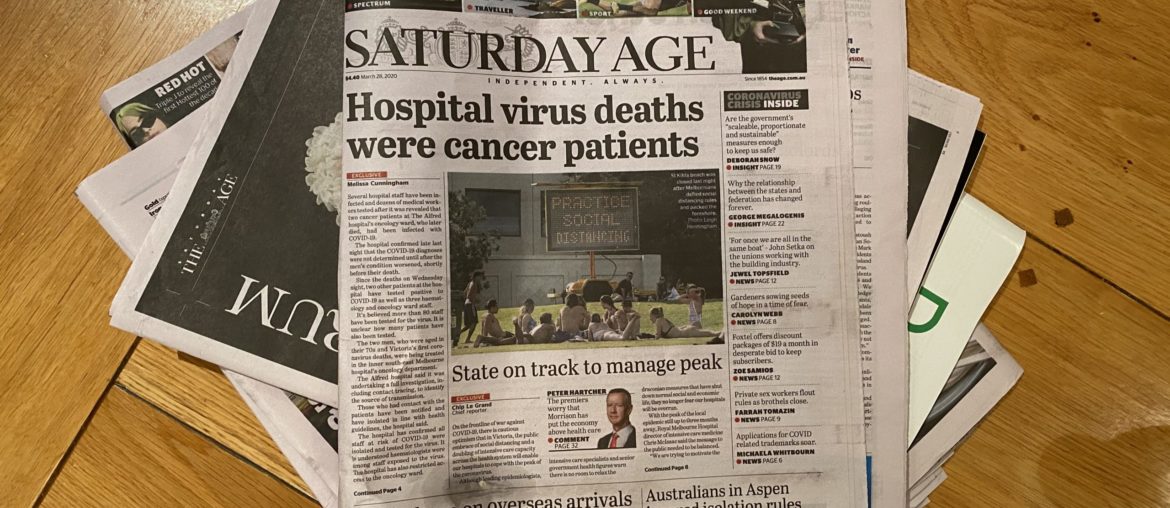When I first started talking about disconnecting from news a decade ago, people looked at me like I was crazy. In rabbinical school in Los Angeles, our Dean, Rabbi Bradley Artson, said we had to keep up with the news as people would expect us to be informed about the goings on in the world and so that we could tie in current affairs with ancient Jewish text in our sermons. I honoured much of his advice, and think it is helpful to connect current concerns to our historical ones, as a way to link us to the timeless nature of much of the human story, but I suggest we keep our intake of News to a minimum, that we ask News stations to bring us a variety of ‘uppers’ along with the ‘downers’ and that we balance out the news with a good dose of joyful content consumption. Seeing as most of us will continue to watch the news, I hope we can counter it by actioning what we can to bring positivity into the world.
My dear cousin in Israel, who I consider to be highly evolved told me she needs to meditate before listening to the News there. The fact that she must prepare herself for the inevitable onslaught of (bad) news tells me that its negative effects are not to be underestimated.
I’m not suggesting refraining from a daily news briefing, especially in the current Covid19 climate, where becoming familiar with daily legal changes is a necessity. But we can become obsessed with news intake and it comes at the expense of other things such as headspace for other pursuits and heart space for internal reflection.
Many people now support the thinking that what we focus on expands and similarly, that where we focus our thoughts is where our attention is, which means our attention is mostly on distresses rather than hope and optimism. News has power because it brings us together however, its focus is on negative things that happen. If we truly want to create unity and community, we need human stories, about our lives and about our triumphs as well as our pain.
What if we had a balance of news stories including: breakthroughs in science, volunteer projects, success stories of people in the business, sport, art worlds and at school. If ‘good news doesn’t sell’ then the problem lies with us as much as with the new corporations. I wonder if that is just a myth. We can ask ourselves: would I be interested in hearing about positive things happening in your city, community, country, world? Further, we can ask ourselves, ‘What is our problem, that we would rather hear of woe than joy?!’ What indeed is the psychology around hearing dreaded news from the media? Perhaps our thinking is, “I’ll feel better about my life when I see how bad theirs is.” Perhaps we also can stand in judgement of the rapist or murderer which causes separation from fellow humans rather than generating compassion for all. If we watch a lot of news, we may believe that most of the world is dangerous, especially the men in it. Indeed, the news normalises criminal behavior by mentioning it daily. This misrepresents a basic good in humanity.
News gives coverage and indirect support to terrorism ad violent acts who know their heinous acts will get reported onto us. What if it wasn’t reported?! Some acts would lose their impact and maybe not even transpire.
The News makers are messing with us, contorting our desire to be connected and informed toward wallowing in shared despair. We like to have a shared language and news affords us this, but we could also share around visions for a better world, artwork, poetry, music and family joy.
My hope from writing this is that you would consider what role news has in your life, whether it’s bringing you more joy or sorrow and whether the trade-off in your emotional state is worth the so-called knowledge it provides you with. I would ask you to question whether you have counter measures to bring hope after intaking some of the worst of what humanity can do to itself.
The result from the saturation of news is that we trust others less and less, expect less from each other and likely become disconnected from our emotions, in order to take in what we see and not burst into tears. In my opinion, this makes us sick. (Sorry for the bad news.)
If the news mostly gives us bad news, they will say they are responding to our interests. So where is the sickness within us? We all have a pull to darkness, and a pull to light, a ‘yetzer tov’ (evil inclination) and a ‘yetzer ra’ (good inclination.) In my view, news is insidious because it pretends to appeal to our yetzer tov: to inform and educate us, to keep us connected in common knowledge and warn us of dangers, but it actually is directed to our yetzer ra, to that part of us that feels helpless about turmoil in the world, that doubts the goodness of humanity and that reviles in another’s pain.
So, to borrow from our ancient wisdom, I ask you, which inclination do you want to feed?


Comments are closed.